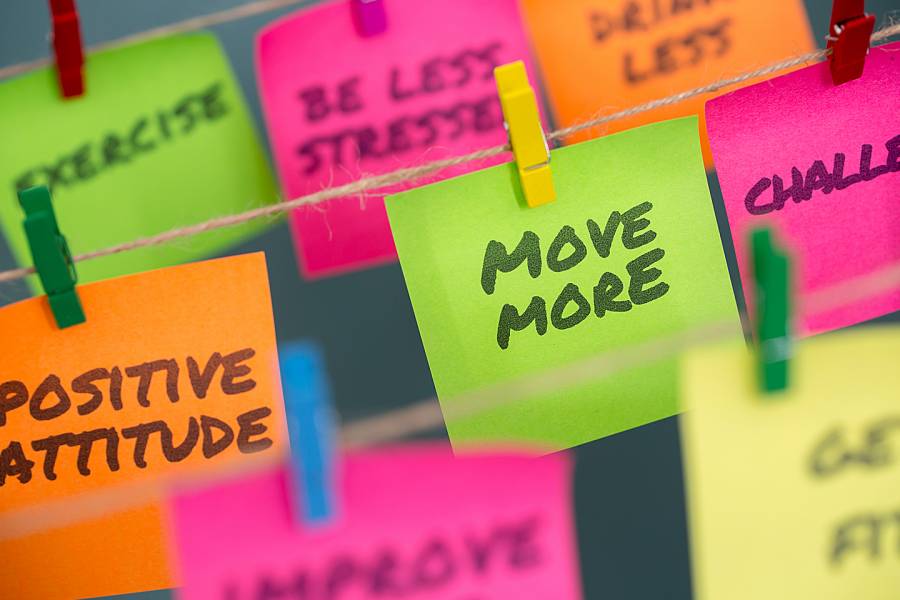In this installment of the mySupport Coping and Thriving series, Anthony Meek, a mySupport clinician, gives guidance on setting realistic goals during stressful times.
2020 was a year that provided much uncertainty and many challenges. COVID-19 restructured the way we lived and interacted with the world around us. Plans and expectations we had for the year needed to be readjusted, and goals that we set needed to be changed. Almost a year later, we are still navigating the change in an unpredictable world.
Over the course of the past 10 months, routines have been adjusted, coping strategies have been altered, public health responses have been more widespread, and we have found the sense of a "new normal." There is an air of optimism with a vaccine and the idea of returning to the way that life was—a world where we can embrace our 2020 goals and hopes as soon as 2021.
However, barriers to that reality await, and challenges of the altered holidays and changing weather shortened not only our daylight but also our patience. The holiday season is often a time of goal setting and resolution making. It is a time when families and friends gather and experience closeness and excitement, but this year, frustration and fear were more common.
There is hope that 2021 will be better, and looking ahead can be therapeutic. Setting goals, and making strides to better ourselves, is a healthy way to approach the future. However, it is important during a time of uncertainty and change that we focus on realistic and flexible goals that can be met.
One proven approach to moving forward is to set goals that are SMART: Specific, Measurable, Attainable, Relevant, and Time-bound. SMART goals are met objectively, and progress can be tracked to encourage individuals to stay consistent with the goals and feel accomplished about the progress made. SMART goals can be readjusted and refined during times of uncertainty. SMART goals should be challenging but not impossible to accomplish, and they can be set daily, weekly, and/or monthly to track progress and increase a sense of accomplishment.
Managing the stress of uncertainty and change is always important. When we were first introduced to COVID-19, we were faced with the challenge of adapting to new routines and coping strategies. As the season has changed and cases and hospitalizations are spiking, we are once again tasked with the responsibility of creating new routines and coping strategies. Fatigue and frustration are setting in, and responding to the continued stress can be either adaptive or maladaptive.
Adaptive coping refers to strategies that protect our physical and emotional health. Maladaptive coping refers to strategies that are detrimental, and although they may feel good in the moment, they have longer-term negative effects. High levels of emotional pain and stress are associated with maladaptive coping because the responses are often easy and immediate; some of the common forms are behavioral disengagement, denial, self-blame, substance use, and "venting."
To promote good physical and emotional health and improve long-term outcomes, we need to find adaptive ways of coping that fit into our lifestyle and routine. Common strategies are mindfulness, physical activity, personal expression, gratitude practice, cultivating self-compassion, and reframing patterns of thinking.
Creating routines and committing to the energy and effort it takes to get started with adaptive coping strategies are hard, especially when you're already experiencing stress. Making the time for self-care and healthy coping often feels impossible with so many other competing demands. But engaging in adaptive coping strategies that work for you not only reduces stress in the moment but also improves overall health and resilience in order to deal with future stress.
For many people, 2020 felt out of control, and the prospect of a different year and new possibilities is exciting and optimistic. It is important to recognize that many of the same challenges, as well as new ones, will exist well into 2021. We are tasked with the test of continuing to respond to those challenges and also setting goals in order to create routines and a lifestyle that adaptively copes with the stress. Identifying what each of us has control and influence over in a world of uncertainty is hard, but being an active participant in the change you want for yourself is necessary to achieve healthy outcomes.
To jump-start your 2021 resolve, tune in to the mySupport webinar Healthy Strategies for the New Year. Details below.
Need more help? Johns Hopkins mySupport is available to assist employees, postdocs, house staff, and their household family members with a wide range of issues, including any concerns or questions you may have. You can contact mySupport at 443-997-7000.
Coping and Thriving webinar: Healthy Strategies for the New Year
Join a mySupport on-site clinician to learn about healthy strategies for coping in the new year while navigating a global pandemic. The webinar will provide overviews of mySupport services for employees and their household family members as well as discussions of healthy strategies and realistic goal and expectation settings for the new year, to include:
- How to set goals and expectations
- How to cope in a pandemic with continued safety limitations.
- Why it's important to adopt strategies that are healthy (i.e., exercise) versus unhealthy (i.e., alcohol and substance abuse)
Register here for the webinar, which will be held from 4 to 5 p.m. on Wednesday, Jan. 20.
Posted in Health+Well-Being
Tagged hr newswire








